Arts
Another view of A View From The Bridge
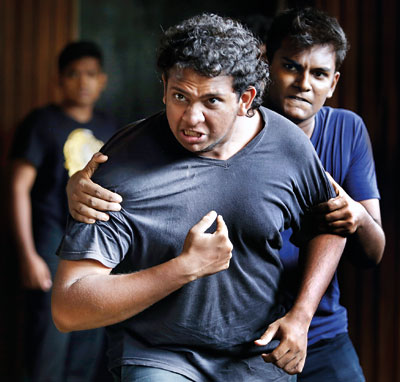
Intense moment: Lihan Mendis as Marco and Joshua Joseph. Pix by M.A. Pushpa Kumara
Colombo audiences can expect something raw and powerful from the Workshop Players when they stage Arthur Miller’s play from October 7-9
It’s a typical Italian family reunion when brothers Marco and Rodolpho first enter the Carbone household. There’s unapologetic excitement and warm embraces making it easy to get lost in the normalcy of the scene despite the fact that the actors are boxed in by a few benches. In fact, it only zooms in on the cosiness of Eddie and Beatrice Carbone’s simple home in the heart of Brooklyn’s “Little Italia”. A few scenes later when Eddie betrays the illegal immigrant brothers, the ugly confrontation that follows, still in the confined space, forces you to shrink back, the space now looking more and more like a boxing ring.
When veteran director Jerome L. De Silva first began rehearsals for Arthur Miller’s “A View From the Bridge”, he didn’t imagine that a few practices later, he would throw out the props and sets. Transforming Miller’s already intense script into a powerfully raw production, its hollowing nakedness shatters the boundary between actor and audience, performance and reality.
“It’s stripped out completely,” he says of his avantgarde vision for the play. Set in the 1950s, “the Bridge” offers a microscopic look into the lives of the Italian American community and the thorny issues of immigration. First staged in 1955, the play has been made and remade for the stage, film and TV; the recent Broadway production picking up two Tony awards.
In fact it was the blank white square of a stage that was used in the current Broadway revival that stuck in Jerome’s mind since he first watched it. Having blocked the play in the first few sessions, “I felt it was too cumbersome,” Jerome admits, the gramophones and other period props taking away from Miller’s finely crafted script. So inspired by the current revival, he kept only the characters “and one prop”, which paid off. “It’s coming through powerfully.”
The idea to stage a serious play, and one by Arthur Miller is no coincidence. “Everybody thinks Workshop does only musicals,” he remarks. While they are best known for their gigantic musical theatre productions, Jerome’s connection with Arthur Miller is one that goes back more than 20 years. He has put together productions of Miller’s iconic “Death of a Salesman” in Sinhala and even met the playwright back in 1996 when he was a fellow at the Salzburg Seminar, Austria and Miller was on the course faculty. These days, Jerome is teaching the play as part of the syllabus for local O/L and A/L students. It’s one of the reasons he wanted to do the production in the first place, for the benefit of teachers and students. “It’s also relevant to the current problem of immigration,” he says.
Keeping close to Miller’s style “the Bridge” follows the ‘all American family’ and the issues of purpose and social consciousness. Based in “Little Italia,” by the Brooklyn Bridge the story is narrated throughout by Alfieri; an Italian American lawyer. He introduces us to the story’s protagonist- Eddie Carbone. Living with his wife Beatrice and adoptive niece Catharine for whom he has an improper love and obsession, Eddie’s world crumbles when his wife’s two young cousins arrive (illegally) and one begins an affair with Catharine.
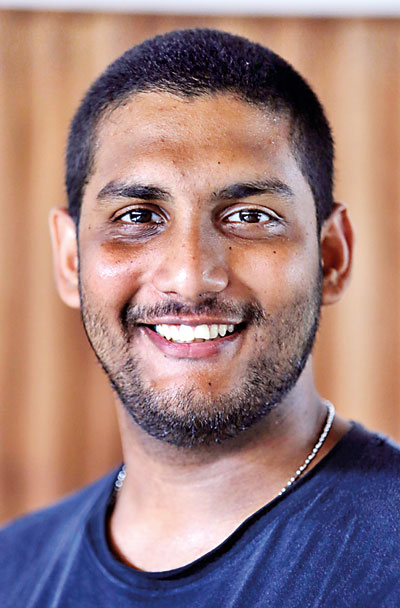
Kanishka Herat
Playing the part of Alfieri are Dino Corera and Anuk De Silva. A lawyer in his fifties, Alfieri is our guide through the Italian American slums of Brooklyn. Very much American by now, his instincts are still meshed in his Italian ancestry. “He’s the unbiased view,” explains Anuk, Alfieri being the cross between the two worlds. Although he doesn’t play a meaty role in the play Alfieri is an important technique- the only character who interacts with the other characters and audience. “He literally is the bridge between the two worlds,” adds Dino.
Although “the Bridge” is steeped in the culture of a different time and place, it’s not material entirely unfamiliar to the cast. “It’s all about what’s right and wrong, what’s moral and immoral,” the seasoned actors tell us.
Together with Miller’s seemingly casual dialogue and Jerome’s style of free interpretation, the actors themselves aren’t too sure whether their characters are as good or bad as they seem.
For 20-year-old Lihan Mendis and Rehan Amaratunga, this ambiguity adds to the depth of the play. Marco and Rodolpho are brothers who leave poverty stricken Sicily for a better life in America. Arriving as illegal immigrants, their entrance causes a complete shift in the play when Rodolpho starts dating Catharine.
Easily towering over the cast members, Lihan had the ideal ‘look’ for Marco. The older of the two, big, brawny Marco is a hard working family man who leaves his sick, starving children for America hoping to support them and one day go back. “You see the different types of immigrants,” offers Lihan. Having played Othello in “Shakespeare in the Park” a few months ago, this time around he found himself playing a character with good intentions who has to deal with a horrible twist of fate.
Rehan’s role on the other hand is the complete opposite of Marco’s. The blond, charming and jazz singing Rodolpho is the guy who comes to America with big dreams including the one where he never wants to go back home. Determined to make it happen for himself, he catches the eye of Catherine. While Eddie is the obvious protagonist, Rodolpho becomes the catalyst for the coming chaos in the family.
Rehan first came on the Colombo theatre scene with his take on Oberon in Midsummer Night’s Dream as part of Shakespeare in the Park. Although this is relatively a darker, more serious play “It’s a work of art” he feels. Rodolpho is the brightest character we will meet, he adds, smiling. But does he really love Catherine or is he just using her to make his status legal? The young actor himself isn’t really sure.
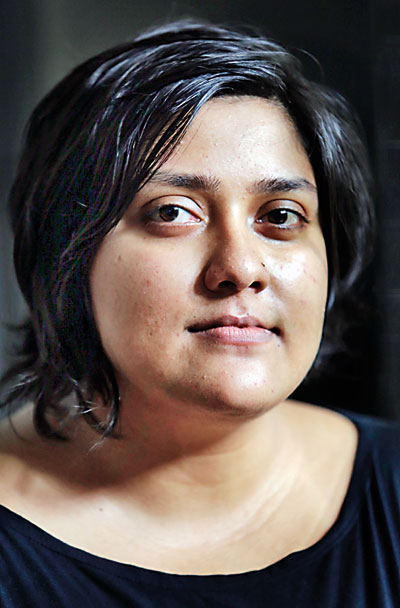
Dinushka Jayawickreme
Catherine, Beatrice’s 18-year-old orphaned niece has lived with the Carbones her entire life. A teenager on the cusp between childhood and adulthood, we first meet her as a naïve young girl who has an especially close bond with her uncle who still treats her like a little girl.
When Mayanthi De Silva first walked into the audition, she came, intending not to act but to help out. Listening to Jerome explaining the story to them had her thinking more and more about Catherine. Mayanthi who is passionate about her research on child abuse- (Catherine comes from a loving home but is suffocated by her over possessive uncle who harbours an unwilling obsession for her) changed her mind. “It’s not abuse but she should have been guided whereas she is manipulated” by the male figures in her life. Playing an 18-year-old came with its own challenges for the 26-year-old- “it’s emotionally draining” she offers.
Playing the only other female role is Dinushka Jayawickreme. Eddie’s wife and the cousin of Marco and Rodolpho, Beatrice like Catherine doesn’t get as much talk time as her male counterparts. A woman in a 1950s conventional Italian household, she allows her husband to take the driving seat, but is clearly the heartbeat of the home. This is the first speaking role for Dinushka who is recognized more for her powerful singing performances in musicals such as Phantom of the Opera, Sound of Music and with the Soul Sounds. Although the play is more male centric, Miller offers a glimpse into the position of women in an immigrant Italian society. We see Beatrice trying to be a good wife, but that doesn’t stop her from seeing the truth in every character and giving her opinion. Struggling to keep her collapsing family from falling apart, her situation both Dinushka and Mayanthi feel is not that different from women in Sri Lanka.
A clear favourite is the story’s tragic protagonist- Eddie Carbone. The longshoreman and head of his family, when we first meet Eddie he is your typical Italian father- slightly possessive, yet caring with a strong sense of honour and work ethic. Interestingly, Eddie, and the play in general break the stereotype of Italian Americans we see as the slick, suit wearing, calculating, powerful mobsters in the Godfather or the Sopranos.
Kanishka Herat relishes playing the complex family man. “We’re seeing a complicated character in a domestic scene,” – the tragic hero being an ordinary, middle- aged working class guy. Described as one of Miller’s finest characters he has a strong sense of respect and honour. During the play Eddie goes from being the possessive father not wanting his little girl to grow up to longer than necessary embraces with Catherine and the almost animalistic jealousy and violence he displays towards the brothers.
At the end of a gruelling rehearsal Kanishka can’t help but sympathize with the inherently grey and conflicted character. “He can’t believe his own desires” the young actor enlightens us as we watch Eddie struggle with his own feelings of self-disgust. For Kanishka, it’s a scenario that could happen in any household. “Personally I feel like there’s a lot of similarity” he says, between the strong family values of Italian culture and Sri Lanka, making it that much more relatable.
Together with the script and direction “there’s room for so much interpretation,” he explains. Set against the liberally “less is more” set, the actors revel in the uncertainty of their characters and leave the audience with a slap in the face shock of “what-did-we -just watch” long after they have left the hauntingly claustrophobic confines of the square.
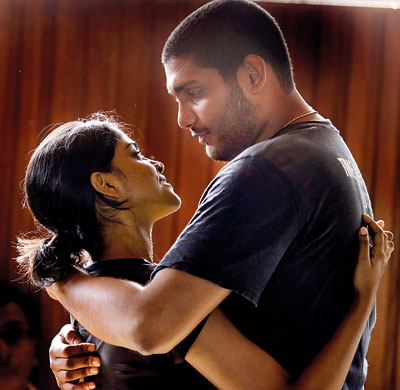
An unhealthy relationship: Kanishka Herat as Eddie Carbone and Mayanthi de Silvab (also pictured on the cover) as Catherinea
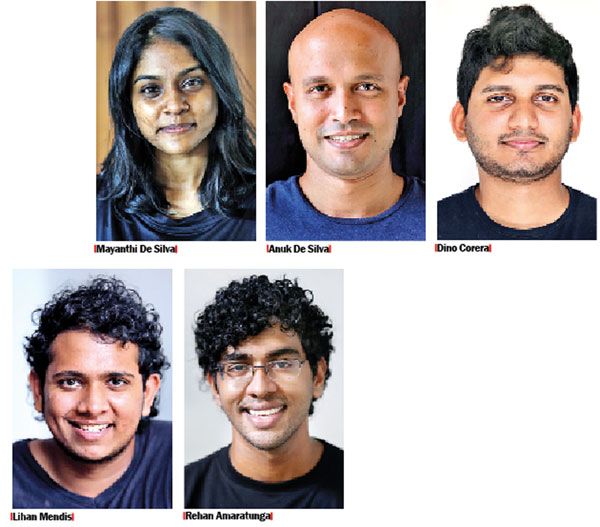
“A View From the Bridge” goes on the boards from October 7-9 at the Lionel Wendt Theatre. Tickets priced at Rs. 2000, 1000, 750, 500 are available at the
Lionel Wendt Theatre.

